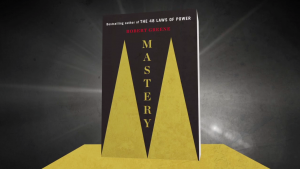Mastery: A Book Review
- lenleatherwood

- Mar 27, 2014
- 3 min read
Over the past several weeks, a student and I have read Mastery by Robert Greene. This book tracks a whole realm of “masters” in many different fields and chronicles their life stories. The point of most of these stories is that these individuals were not remarkable at the outset, but became masters through years of adversity, focus and hard work. Darwin, Edison, Ford, come to mind immediately, along with Mozart and Leonardo Di Vinci. I was shocked to read that Leonardo wasn’t allowed to attend school because he was officially a “bastard,” so instead he spent his days in the woods examining and drawing plants and flowers with great detail. Also, it was interesting to learn that Darwin was the less inspiring of two brothers and his father worried that he would never amount to much.
This book celebrates the idea of mastery being a long-term process (lifelong is a better word) and that there are no shortcuts to reach that goal. Also, that all the meandering one might do in one’s life (as long as it is in the general direction of your passions) will only serve to provide more experience to add to your arsenal of skills in the long run. Darwin spent 8 years studying barnacles after he’d come up with the theory of natural selection simply because he believed more study was necessary to bolster his theory.
Of course, it’s always good to read this sort of book, particularly when I am still plugging away at my passion of writing. Greene’s message is keep plodding and don’t worry about the outcome. Recognize that there will be a moment when all this information will come together and shift to mastery. Don’t rush. Be happy in the moment pursuing what you love and recognize that you may have to make money doing something else. Einstein was working in the patent office when he came up with his Theory of Relativity. He purposely picked that job because he would have time to consider his theory during work hours.
Greene also spends a fair amount of the book discussing emotional intelligence. His point is that mastery comes from gaining intellectual knowledge as well as social knowledge. He pointed out several poor souls who made major discoveries only to have such poor social skills that their colleagues wouldn’t listen to what they had to say. One example was a doctor who figured out 80 years before it became common knowledge that washing hands in the hospital between patients would prevent the spread of disease. His rush to communicate this information and his approach of a declaration without subsequent research resulted in his being blackballed by the medical society. How many lives were lost because he didn’t know how to be persuasive and others were digging in their heels resisting new information? A lot is the short answer.
I would recommend this book for anyone who wants some bolstering up when in mid-pursuit of a long-term goal or for a novice who is looking for direction. Greene gives many examples of people who stumbled upon their life’s work in spite of themselves, and also of others who persevered long after most people would have given up. This will certainly help give a good kick in the pants to anyone who needs one to move forward with their dreams. After reading about some of these “household names” and their challenges, you might feel slightly embarrassed to offer up some half-baked excuse for why you are not pursuing your dreams.
It’s a thick book, but an easy read. If you are in need of inspiration, this will get you headed in the right direction. I recommend it for those who like this type of book and/or for those who need a reminder that mastery isn’t something you check off your list at age 25. 35 or 45. If you have done that, then you might need to reconsider your goals.








Comments